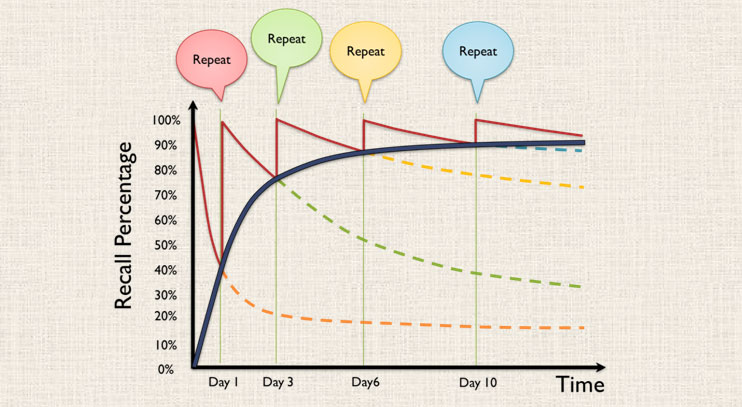Spaced repetition is a study method used to put information you studied into your long-term memory. Your HSC year goes for just over a year and you will be tested multiple times on your knowledge of content as you learn it each term. Spreading out your study and using the method “spaced repetition” will make it much easier for you to remember the content when needed. So often I see students forge the content covered in term 4 when they come back from their summer holidays let alone in October when they need it for their HSC exams.
Spaced repetition is a smarter way to study. It will sound like you are doing more study, but in the end you will require less revision time and allow yourself more time to do practice questions and to test yourself (the best study methods around).
Spaced repetition – The method
Spaced repetition is when you repeat or go over your content and gradually increase the time (space) between each repetition. The time gaps should begin small and double as you revise, e.g.) 1 day, 2 days, 4 days, 8 days, 16 days etc. As you progress through this, your retention and recall of information improves (see graph below).
I want you to note here that the first week makes the biggest impact. Simply by going over the content 3-4 times in the first week increases the percentage recall by 50% which is a huge advantage.
Reviewing the content by spaced repetition helps you to remember the content long-term. This means that by the time your exams come around, you don’t need to spend time writing and reading summaries or even worse your text book or this site. By spacing out your study you do not need to cram (the worst study method known to man) and can dedicate more time to more effective study methods such as refining your exam skills to ensure you are answering questions and writing clearly.
Spaced repetition requires you to revise content closer to when you learnt it, than the exam. So the day after you learn something, you should revise it. Actually you will be revising the content frequently for a week and then roughly a fortnight later, then a month later. This study method helps to cement your syllabus content so that you have more time to think about examples, application and writing band 6 exam responses.
Now remember, this process needs to be applied to all your new content. So each week you need to ensure you are revising what you learnt that week and last week. You should then schedule a day each month to revise the last month and another day every 2 months to revise older content. This will help ensure that you are developing the neural pathways for fast and confident recall of information. The more this “study” forces you to test your memory, maybe through flashcards or simply saying everything you know about a topic out loud before checking it can further improve these pathways to ensure you have the best chance of success in your exams.







